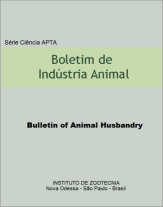Repeatability of in vitro embryo production in Nellore breed
Palabras clave:
bovine, fertility, in vitro productionResumen
Recent advances in the field of animal assisted reproduction have allowed faster dissemination of animals with superior genetics. In cattle, the development of some biotechnologies such as the in vitro production (IVP) of embryos optimized the use of oocytes, which represents a great improvement in embryo production world-wide. Therefore, females with high net merit can be multiplied more efficiently to maximize the number of their offspring. The use of ultrasound-guided transvaginal follicle aspiration combined with IVP allowed wide commercial transfer of IVP-embryos with satisfactory pregnancy results. Yet, there are a number of unanswered areas including the level of repeatability and predictability in IVP systems. Thus, the aim of this study was to evaluate the repeatability of some variables related to IVP of bovine embryos from Nellore breed. The study was conducted from 2011 to 2012 using 42 Nellore cows housed at the Centro APTA Bovinos de Corte located in Sertãozinho-SP, Brazil. Donors were kept under the same management throughout the entire experimental period. All animals underwent a total of 25 transvaginal ultrasound-guided follicular aspiration sections. Oocytes were retrieved and handled similarly by Sexing Technologies using semen from 11 sires. Repeatability was evaluated in the following variables: total number of oocytes, embryos and viable oocytes, viable oocyte rate (number of viable oocytes divided by the total number of oocytes), and the embryo rate (total number of embryos divided by the number of viable oocytes). Statistical analyzes were performed with the PROC GLIMMIX (SAS Inst., Inc., Cary, NC). Resulting repeatability for the above mentioned variables were: total number of oocytes = 0.72; numbers of viable oocytes = 0.73; number of embryos = 0.65, rate of viable oocytes = 0.14 and embryo rate = 0.18. It was observed that variables having poisson distribution such as total oocytes, number of oocytes and viable embryos showed high repeatability over time. Interestingly, variables reported as percentages as for viable oocyte rate and embryo rate did not show high repeatability. As a result, donors who had high numbers of viable oocytes didn€™t necessarily yield a consistent percentage of good quality embryos throughout the IVP sessions. In conclusion, among all studied variables, the total number of oocytes, number of viable oocytes and number of embryos showed high repeatability in Nellore cows.Descargas
Descargas
Publicado
Número
Sección
Licencia
Os autores não serão remunerados pela publicação de trabalhos, pois devem abrir mão de seus direitos autorais em favor deste periódico. Por outro lado, os autores ficam autorizados a publicar seus artigos, simultaneamente, em repositórios da instituição de sua origem, desde que citada a fonte da publicação original seja Boletim de Indústria Animal. A revista se reserva o direito de efetuar, nos originais, alterações de ordem normativa, ortográfica e gramatical, com vistas a manter o padrão culto da língua e a credibilidade do veículo. Respeitará, no entanto, o estilo de escrever dos autores. Alterações, correções ou sugestões de ordem conceitual serão encaminhadas aos autores, quando necessário. Nesses casos, os artigos, depois de adequados, deverão ser submetidos a nova apreciação. As opiniões emitidas pelos autores dos artigos são de sua exclusiva responsabilidade. Todo o conteúdo deste periódico, exceto onde está identificado, está licenciado sob a Licença Creative Commons Attribution (CC-BY-NC). A condição BY implica que os licenciados podem copiar, distribuir, exibir e executar a obra e fazer trabalhos derivados com base em que só se dão o autor ou licenciante os créditos na forma especificada por estes. A cláusula NC significa que os licenciados podem copiar, distribuir, exibir e executar a obra e fazer trabalhos derivados com base apenas para fins não comerciais.













